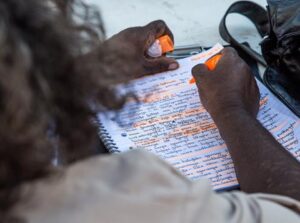The Pitjantjatjara Bible translation project has its roots in the Ernabella Mission which was established by Dr Charles Duguid and Presbyterian missionaries in 1937. Dr Duguid established Ernabella to provide a buffer zone between Pitjantjatjara people and the encroaching European culture.
“From the outset the mission philosophy was to honour the language. They wanted Pitjantjatjara to be spoken. They made sure all the education was in Pitjantjatjara language. They didn’t want to impose English on them,” says Bible Society Australia (BSA) translation coordinator, Dave Barnett, who has coordinated the Pitjantjatjara Old Testament translation project for 12 years, working with over 30 Pitjantjatjara translators living in Adelaide, Central Australia, Darwin and WA. He continues, “Bible translation was an important part of the mission, so in the early 1940s, the Bible translation project commenced and they translated the Lord’s Prayer.” Translation gradually expanded over time until the entire New Testament, together with approximately 10% of the Old Testament, was finally published in 2001.
With over 155 of the estimated 300 Indigenous Australian languages having vanished since 1788 and 110 classified as critically endangered, Australia’s rich linguistic heritage is under threat. The Pitjantjatjara language is a notable exception to this troubling trend, thanks to the legacy of the Ernabella Mission, the dedication of Pitjantjatjara teachers, and the ongoing support of BSA in working alongside local translators to create many Bible resources in language.

Unlike English, which has multiple Bible translations available, Pitjantjatjara speakers rely on a single version of the Scriptures. “We have to walk that tightrope between making it really accurate on the one hand—making sure it’s actually reflecting the Hebrew—but also understood by people that maybe don’t know a lot of the older language as well,” explains Dave. This translation must serve multiple functions; it is the Bible preached from in church, read in Bible studies, and shared with children at home. Every decision made in the translation process affects how Pitjantjatjara speakers engage with and understand God’s Word.
A recent live translation of the Book of Proverbs at the Koorong Adelaide store sparked deep discussions about translation philosophy. Anyone from the community could come to watch Dave and some of the team work on the translation and ask questions. “I think for a few people, they were like, ‘Oh, that’s the first time I’ve actually thought about that,’” Dave recalls. Every word matters because, for many, this will be their only exposure to the biblical text. Translators must ensure accuracy, faithfulness to the original text and accessibility for generations to come.
For the BSA team translation and community are entwined. “You can’t just have your neat Bible translation work over here and then sort of ignore the rest of the translator’s life because they are integrated,” says Dave. There are needs that extend beyond the translation work, be it driving someone to a health appointment, or picking up someone’s grandchild from school. “They’ve taught me so much about how to live through adversity and how to trust in God through adversity, because a lot of these translators have really difficult lives,” he says.
“For a lot of the translators, it’s been some kind of crisis in their life that has brought them to the work. A decisive moment where it’s like, oh wow, we need, our communities need God’s word,” shares Dave. As they commit their lives to this demanding work, they trust that their children and grandchildren watching on will continue in the faith and one day take up the call to this ministry to their communities.
As of 2024, the Pitjantjatjara Old Testament translation project is 40-45% complete, with every book now having at least a first draft.
Prayer for the Pitjantjatjara Old Testament Translation Project